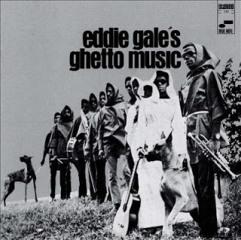Eddie Gale's - Ghetto Music (1968)
Eddie Gale's - Ghetto Music (1968)

1."The Rain" - 6:30 2."Fulton Street" - 6:51 3. "A Understanding" - 7:41 4."A Walk With Thee" - 6:09 5."The Coming of Gwilu" - 13:37 Eddie Gale - trumpet, thumb piano, steel drum, bird whistle Russell Lyle - tenor saxophone, flute Jo Ann Gale Stevens - guitar, vocals James "Tokio" Reid, Judah Samuel - bass Richard Hackett, Thomas Holman - drums Elaine Beener - lead vocals Sylvia Bibbs, Barbara Dove, Evelyn Goodwin, Art Jenkins, Fulumi Prince, Edward Walrond, Sondra Walston, Mildred Weston, Norman Wright – vocals
The aesthetic and cultural merits of Eddie Gale's Ghetto Music cannot be overstated. That it is one of the most obscure recordings in Blue Note's catalog -- paid for out of label co-founder Francis Wolff's own pocket -- should tell us something. This is an apocryphal album, one that seamlessly blends the new jazz of the '60s -- Gale was a member of the Sun Ra Arkestra before and after these sides, and played on Cecil Taylor's Blue Note debut, Unit Structures -- with gospel, soul, and the blues. Gale's sextet included two bass players and two drummers -- in 1968 -- as well as a chorus of 11 voices, male and female. Sound like a mess? Far from it. This is some of the most spiritually engaged, forward-thinking, and finely wrought music of 1968. What's more is that, unlike lots of post-Coltrane free jazz, it's ultimately very listenable. Soloists come and go, but modes, melodies, and harmonies remain firmly intact. The beautiful strains of African folk music and Latin jazz sounds in "Fulton Street," for example, create a veritable chromatic rainbow. "A Walk with Thee" is a spiritual written to a march tempo with drummers playing counterpoint to one another and the front line creating elongated melodic lines via an Eastern harmonic sensibility. The final cut, "The Coming of Gwilu," moves from the tribal to the urban and everywhere in between using Jamaican thumb piano's, soaring vocals à la the Arkestra, polyrhythmic invention, and good, old-fashioned groove jazz, making something entirely new in the process. While Albert Ayler's New Grass was a failure for all its adventurousness, Eddie Gale's Ghetto Music, while a bit narrower in scope, succeeds because it concentrates on creating a space for the myriad voices of an emerging African-American cultural force to be heard in a single architecture. This is militant music posessed by soul and spirit. ---Thom Jurek, Rovi
download (mp3 @320 kbs):
yandex 4shared mega mediafire zalivalka cloudmailru uplea








